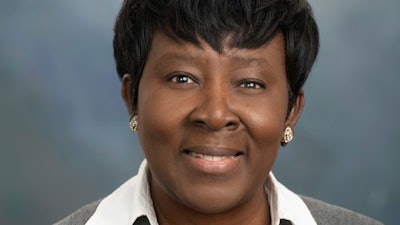Dr. Elizabeth Armstrong-Mensah has been involved in the field of public health for much of her career, tackling such global challenges as HIV/AIDS and maternal and child health.
Now, the Association of Schools and Programs of Public Health is recognizing and honoring her with the 2023 ASPPH Early Career Teaching Excellence Award for her most recent work as a clinical associate professor at the Georgia State University School of Public Health, a role she has held since August 2017.
“I think it evolved naturally,” said Armstrong-Mensah, who is also the lead faculty member for the school’s Ghana study abroad program, referring to her focus on public health. “I started out in my country of origin, which is Ghana. When I finished my master’s, I started to work right away, and I got a job doing work in rural water supply and sanitation. And that right there is a global public health issue. Thus, I found myself by default working in public health. It gives me lots of satisfaction.”  Dr. Elizabeth Armstrong-Mensah
Dr. Elizabeth Armstrong-Mensah
She said her work has covered public health matters such as global health, HIV/AIDS, water and sanitation, maternal and child health, and girls’ education.
“Public health is very crucial today as it was several years ago,” Armstrong-Mensah said. “Public health seeks to prevent disease, promote health, and prolong life. These are things we’ve experienced throughout our life. I don’t know that there’s been a point in time in history where we haven’t concerned ourselves with any of these.”
Her career has involved extensive work with health organizations, such as roles as a health scientist for the Center for Global Health of the Centers for Disease Control and Prevention; an Oak Ridge Institute for Science and Education (ORISE) evaluation fellow at the CDC National Center for Environmental Health; a capacity-building and training consultant for the CDC; and a national program officer for the United Nations World Food Program.
In academia, she taught as an instructor in the Emory University Center for Human Health and assistant professor at the Morehouse School of Medicine, where she designed the Master of Public Health Global Health Track.
Armstrong-Mensah holds a Ph.D. in international affairs and development from Clark Atlanta University, and an M.A. in international affairs and a B.A. in sociology from The University of Ghana.
During her time as an educator, Armstrong-Mensah said she designed nine new courses; taught more than 1,200 students, both graduate and undergraduate; and authored multiple articles and co-authored some with more than 50 students. She was awarded the 2019 Excellence in Teaching award at GSU’s School of Public Health and a reading award from the British Medical Association for her global health textbook.
From her experience in the public health sector, Armstrong-Mensah said that public health officials should continue to focus on mental health, health equity, destigmatizing HIV, and maternal and child health along the continuum of care.
“Maternal and child health continuum of care means care that is provided along the life course for mothers and children,” Armstrong-Mensah said. “If you provide mothers with care only when they are pregnant, you really are not solving any problem. Because the thing is, this mother was a child before she became pregnant. How was she cared for as a child? Did she receive proper nourishment? Did she receive all the care that she needed before she became pregnant?
“So, the continuum of care for the mother focuses on providing care for the mother when she was an adolescent, became pregnant, delivered, after delivery, [and] through motherhood,” she continued. “Now to the child - did they receive continuous care when they were in their mother’s womb, became a neonate, an infant, and then a child? Providing care along the life course helps mother and children to survive and realize their full health potential.”
Although the multidisciplinary field may not pay too much, Armstrong-Mensah said, the work is satisfying and fulfilling, and it will help broaden one’s scope.
“Public health is a profession that really saves lives, in the sense that, when there’s a pandemic or major outbreak, public health professionals are out there, seeking the good of the public,” she said. “A profession in public health will put you in good standing to help others.”















